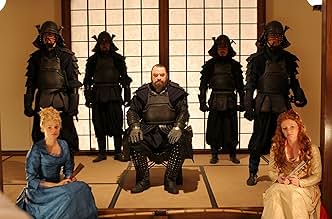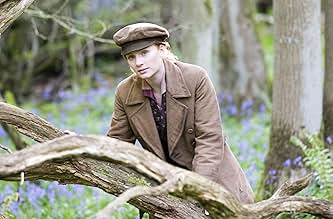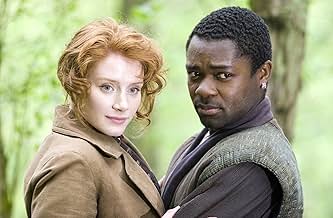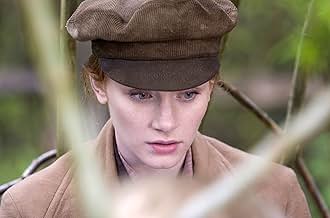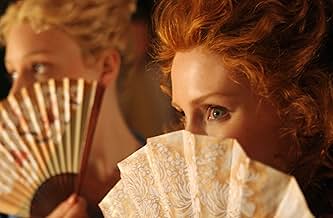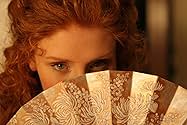VALUTAZIONE IMDb
6,0/10
3960
LA TUA VALUTAZIONE
La figlia del potente Duca deve mostrare il suo coraggio e la sua inventiva per stare con l'uomo che ama.La figlia del potente Duca deve mostrare il suo coraggio e la sua inventiva per stare con l'uomo che ama.La figlia del potente Duca deve mostrare il suo coraggio e la sua inventiva per stare con l'uomo che ama.
- Regia
- Sceneggiatura
- Star
- Premi
- 1 vittoria e 6 candidature totali
Nobuyuki Takano
- Charles
- (as Nobuyuki "Daishi" Takano)
Recensioni in evidenza
Here's one of the most intriguing challenges in all the lands of imagination.
Shakespeare invented much of what it means to be a modern human. But he did so in a very constrained way of communicating. The plays were all about language and geometry on how the come to us, and within that vessel he grew images. That sparseness was what allowed him to shape the language so finely, thus creating the poetic spins that find valence in us.
Okay. If you have seen Shakespeare done as it originally was, you'll know what I mean. The plays work well when read silently or aloud as well. But how to translate to cinema? How to take something that is not visual until it enters us, and make it visual before it enters us and make the same magic?
I love how people have tried. Most modern stage productions follow this cinematic challenge as well because now we are a visual society.
Jarman, Greenaway, Luhrman and Taymor have done marvelous things with this challenge. Branaugh is from a different stripe, a sideways approach to this problem. He sometimes moves into pure cinema (Kate's mirrored Ophelia rant, the horses in "Much Ado") but he's primarily worried about stagecraft as theatrically defined. Here he does something different, something so ambitious I'm trilled to be alive for it. Its so clever.
I did not see this at an appointed time, but stumbled on it after a discouraging day. In a sense, it saved my life. It really did. I watched the whole thing with one of those openmouthed grins.
Here's what he did. He transported the setting to Japan and adjusted everything accordingly. Simple idea.
No, its not just Shakespeare with different clothes. Its not just the plot fleshed out with some other setting. Its a translation to a visual expression. Japan has spent a few hundred years building, refining and constraining a visual grammar in much the same way that Northern Europeans did with language. We lose much of what we associate with the plays, that verbal poetry. What we get in its stead is something similar but visually rooted. To establish this of course you have to "show strong" in the beginning, and he does with a completely wordless intrusion, an invasion of guess what? A play!
This Rosalind is exquisite, someone who knows how to shape the space around her the way British actors carefully shape their words. She anchors the whole thing, including an amazing epilogue. Really, you should save this for when you need your life saved, when you need to stroke down melancholy burrs.
Though Branaugh ends with his familiar happydance, by then you will be ready for it, ready to fall in love all over again.
Ted's Evaluation -- 3 of 3: Worth watching.
Shakespeare invented much of what it means to be a modern human. But he did so in a very constrained way of communicating. The plays were all about language and geometry on how the come to us, and within that vessel he grew images. That sparseness was what allowed him to shape the language so finely, thus creating the poetic spins that find valence in us.
Okay. If you have seen Shakespeare done as it originally was, you'll know what I mean. The plays work well when read silently or aloud as well. But how to translate to cinema? How to take something that is not visual until it enters us, and make it visual before it enters us and make the same magic?
I love how people have tried. Most modern stage productions follow this cinematic challenge as well because now we are a visual society.
Jarman, Greenaway, Luhrman and Taymor have done marvelous things with this challenge. Branaugh is from a different stripe, a sideways approach to this problem. He sometimes moves into pure cinema (Kate's mirrored Ophelia rant, the horses in "Much Ado") but he's primarily worried about stagecraft as theatrically defined. Here he does something different, something so ambitious I'm trilled to be alive for it. Its so clever.
I did not see this at an appointed time, but stumbled on it after a discouraging day. In a sense, it saved my life. It really did. I watched the whole thing with one of those openmouthed grins.
Here's what he did. He transported the setting to Japan and adjusted everything accordingly. Simple idea.
No, its not just Shakespeare with different clothes. Its not just the plot fleshed out with some other setting. Its a translation to a visual expression. Japan has spent a few hundred years building, refining and constraining a visual grammar in much the same way that Northern Europeans did with language. We lose much of what we associate with the plays, that verbal poetry. What we get in its stead is something similar but visually rooted. To establish this of course you have to "show strong" in the beginning, and he does with a completely wordless intrusion, an invasion of guess what? A play!
This Rosalind is exquisite, someone who knows how to shape the space around her the way British actors carefully shape their words. She anchors the whole thing, including an amazing epilogue. Really, you should save this for when you need your life saved, when you need to stroke down melancholy burrs.
Though Branaugh ends with his familiar happydance, by then you will be ready for it, ready to fall in love all over again.
Ted's Evaluation -- 3 of 3: Worth watching.
Kenneth Branagh seems to get a fair bit of stick in some places, and I'm never quite sure why. Whether it's because he picks unfashionable projects to direct or star in, or because he comes across as a theatrical English "luvvy", I don't know. But for me, his lonely (almost solitary) championing of modern big screen Shakespeare adaptations has always been cause for celebration. Time and again he has sought to make the bard's literature not only appealing and comprehensible to the audience of today, but also relevant - to show that Shakespeare has always got something to say about society and people. If nothing else, English teachers worldwide must be relieved there are alternatives to showing kids the more archaic Olivier golden oldies.
His latest adaptation, As You Like It, is no exception. For those unfamiliar with the play, it's basically a romantic comedy, with a bit of political drama thrown in for good measure. Here the action is relocated from Middle Ages France to 19th century Japan (stay with me), when the country was being opened up to the West. A small group of Western settlers have more or less set up their own private kingdom here. You can find a detailed plot synopsis elsewhere on the web I'm certain, but I'll try and summarise it anyway: Rosalind (Bryce Dallas Howard) is the daughter of Duke Senior (Brian Blessed, with long white hair), who is usurped by his own treacherous brother, Duke Frederick (Blessed again, with dark hair this time, doing the usurping in a neat wordless sequence). Senior is exiled to the forest with his followers, while Rosalind is forced to remain and keep Frederick's daughter Celia (Romola Garai) company. Frederick becomes paranoid though, and banishes Rosalind as well shortly afterwards. Celia, best friends with Rosalind, decides to accompany her; naturally, both are forced to disguise themselves, which causes complications when the one Rosalind loves, Orlando (David Oyelowo), declares his undying love for her.
Bright, breezy and instantly accessible, Branagh has come up trumps. Staying behind the camera this time out, the cast is led by Bryce Dallas Howard, in a performance that will surely (if there is any justice in the world) attract awards attention. The part of Rosalind is one of the most popular and sought after female roles in all of Shakespeare. She is sweet and kind, but not simpering - she's quite decisive too. She is the dynamic behind the play's actions, and Howard seizes the role with everything she's got. The supporting cast are uniformly excellent too - the legend that is Brian Blessed is always great value, and he does well here in his dual role, particularly the evil Frederick. David Oyelowo is also excellent, while Alfred Molina is very funny in the comic relief role of Touchstone, the court fool. Look out too for Patrick Doyle, the film composer who provides the score here but also performs on screen in the singing role of Amiens.
Obviously the unique spin on this adaptation is the setting. The play is mostly set in the forest of Arden, so nature is a prominent theme throughout. Branagh highlights this by moving the action to pre-20th century Japan, where beauty and peace can be readily found in nature. The film is gorgeous to look at, not only in the forest settings, but also in the 'court' during the first act's coup d'etat - the sets and costumes look brilliant.
I won't try and argue that this is going to be the best film of 2007, because I'm sure that would be nonsense. The film has faults, although some of these might be attributed to the source material (with which I'm not familiar) - one or two characters seem to disappear halfway through, while Duke Frederick's fate is a cop-out even by Shakespeare's standards. But the important thing is that Branagh has made the play very easy to follow, very humorous and also given it a contemporary edge, as well as making an entertaining film in its own right. And for that, he surely deserves a cheer at least.
I urge anyone to seek the film out, whether you're interested in Shakespeare or not, because it is simply great fun. Here's hoping Mr Branagh continues to get his films funded and made.
His latest adaptation, As You Like It, is no exception. For those unfamiliar with the play, it's basically a romantic comedy, with a bit of political drama thrown in for good measure. Here the action is relocated from Middle Ages France to 19th century Japan (stay with me), when the country was being opened up to the West. A small group of Western settlers have more or less set up their own private kingdom here. You can find a detailed plot synopsis elsewhere on the web I'm certain, but I'll try and summarise it anyway: Rosalind (Bryce Dallas Howard) is the daughter of Duke Senior (Brian Blessed, with long white hair), who is usurped by his own treacherous brother, Duke Frederick (Blessed again, with dark hair this time, doing the usurping in a neat wordless sequence). Senior is exiled to the forest with his followers, while Rosalind is forced to remain and keep Frederick's daughter Celia (Romola Garai) company. Frederick becomes paranoid though, and banishes Rosalind as well shortly afterwards. Celia, best friends with Rosalind, decides to accompany her; naturally, both are forced to disguise themselves, which causes complications when the one Rosalind loves, Orlando (David Oyelowo), declares his undying love for her.
Bright, breezy and instantly accessible, Branagh has come up trumps. Staying behind the camera this time out, the cast is led by Bryce Dallas Howard, in a performance that will surely (if there is any justice in the world) attract awards attention. The part of Rosalind is one of the most popular and sought after female roles in all of Shakespeare. She is sweet and kind, but not simpering - she's quite decisive too. She is the dynamic behind the play's actions, and Howard seizes the role with everything she's got. The supporting cast are uniformly excellent too - the legend that is Brian Blessed is always great value, and he does well here in his dual role, particularly the evil Frederick. David Oyelowo is also excellent, while Alfred Molina is very funny in the comic relief role of Touchstone, the court fool. Look out too for Patrick Doyle, the film composer who provides the score here but also performs on screen in the singing role of Amiens.
Obviously the unique spin on this adaptation is the setting. The play is mostly set in the forest of Arden, so nature is a prominent theme throughout. Branagh highlights this by moving the action to pre-20th century Japan, where beauty and peace can be readily found in nature. The film is gorgeous to look at, not only in the forest settings, but also in the 'court' during the first act's coup d'etat - the sets and costumes look brilliant.
I won't try and argue that this is going to be the best film of 2007, because I'm sure that would be nonsense. The film has faults, although some of these might be attributed to the source material (with which I'm not familiar) - one or two characters seem to disappear halfway through, while Duke Frederick's fate is a cop-out even by Shakespeare's standards. But the important thing is that Branagh has made the play very easy to follow, very humorous and also given it a contemporary edge, as well as making an entertaining film in its own right. And for that, he surely deserves a cheer at least.
I urge anyone to seek the film out, whether you're interested in Shakespeare or not, because it is simply great fun. Here's hoping Mr Branagh continues to get his films funded and made.
Kenneth Branagh, aside from being a gifted actor with an enormous range of creative character abilities, has once again brought Shakespeare to life on the screen. His previous excursions into the bard's repertoire have included 'Much Ado About Nothing', 'Henry V', 'Love's Labours Lost', 'Hamlet', and 'Othello', and now he adds one of the bard's most successful comedies AS YOU LIKE IT to his list of successes. Branagh has the gift of making the visual aspects of Shakespeare's stories enhance the language and in doing so he makes Shakespeare sound like brilliant conversation (which it of course is) instead of stilted and brittle old English.
The 'gimmick' used here by Branagh in adapting Shakespeare's play is placing the action in 19th century Japan, and while other less sensitive directors might have opted to insert parody here, Branagh instead makes the story seem all the more plausible - the two feuding brothers (one dark and one light) whose struggle over their estate opens the play before credits with an ingenious silent drama of black leather feudal costumed men invading a genteel house party of lovely people enjoying a Japanese dancer's performance. The original brother is banished with his clan to the Arden forest and there the magic begins. Love between several couples is played in all its manifestations with disguise, misconceptions, lust, and poetry until the play's rollicking end in a song of Hey Nonny Nonny! The lovers include the disguised Rosalind (Bryce Dallas Howard) and Orlando (David Oyelowo), Celia (Romola Garai) and Oliver (Adrian Lester), the court fool Touchstone (a brilliant Alfred Molina) and Audrey (Janet McTeer), and Sylvius (Alex Wyndham) and Phoebe (Jade Jefferies). Brian Blessed plays the roles of both feuding brothers with style and authority, and Kevin Kline offers a fully realized Jaques - the character who is given the most memorable soliloquies in the play. The settings and imagery (Tim Harvey) are artistic and beautiful and captured with style by cinematographer Roger Lanser, and as with all of Branagh's production the music score (here by Patrick Doyle) is letter perfect and atmospheric.
But in the end the kudos go to Kenneth Branagh for his consistent courage and conviction that Shakespeare's plays are timeless, and his devotion to bringing them to the contemporary audience is to be applauded. This is a fine film - one to own! Grady Harp
The 'gimmick' used here by Branagh in adapting Shakespeare's play is placing the action in 19th century Japan, and while other less sensitive directors might have opted to insert parody here, Branagh instead makes the story seem all the more plausible - the two feuding brothers (one dark and one light) whose struggle over their estate opens the play before credits with an ingenious silent drama of black leather feudal costumed men invading a genteel house party of lovely people enjoying a Japanese dancer's performance. The original brother is banished with his clan to the Arden forest and there the magic begins. Love between several couples is played in all its manifestations with disguise, misconceptions, lust, and poetry until the play's rollicking end in a song of Hey Nonny Nonny! The lovers include the disguised Rosalind (Bryce Dallas Howard) and Orlando (David Oyelowo), Celia (Romola Garai) and Oliver (Adrian Lester), the court fool Touchstone (a brilliant Alfred Molina) and Audrey (Janet McTeer), and Sylvius (Alex Wyndham) and Phoebe (Jade Jefferies). Brian Blessed plays the roles of both feuding brothers with style and authority, and Kevin Kline offers a fully realized Jaques - the character who is given the most memorable soliloquies in the play. The settings and imagery (Tim Harvey) are artistic and beautiful and captured with style by cinematographer Roger Lanser, and as with all of Branagh's production the music score (here by Patrick Doyle) is letter perfect and atmospheric.
But in the end the kudos go to Kenneth Branagh for his consistent courage and conviction that Shakespeare's plays are timeless, and his devotion to bringing them to the contemporary audience is to be applauded. This is a fine film - one to own! Grady Harp
How dumb do you have to be to watch a Shakespeare film and then complain, like certain reviews here, that it has Shakespeare's dialogue? What did you expect? Apart from anything else, the dialogue - the poetry of the greatest-ever writer of English - is the whole point. Without that, you have only a highly improbable story made up of contrived situations connected together only tenuously. With it - if it is well performed - a golden, magical glow of love and wit. If you don't understand it, rather than expecting it to be dumbed down to your level you should be prepared to put a bit of work in, read the play over slowly and puzzle it out - or else just admit that it is over your head. But don't blame the play for your own deficiencies.
I'm not fond, though, of the modern fashion for productions with apparently random, irrelevant concepts - in this case old-time Japan - to which Branners adds by his insistence on casting American stars who (inevitably) can't really handle the dialogue.
I'm not fond, though, of the modern fashion for productions with apparently random, irrelevant concepts - in this case old-time Japan - to which Branners adds by his insistence on casting American stars who (inevitably) can't really handle the dialogue.
As You Like It is my favorite Shakespearean comedy, and my high expectations of the new Branagh version were not put to shame. Set in a lush, beautiful forest in an imaginary old Japan, populated by people of all races, this version is an innovative and modern one rather than a conventional and classical one - and it works.
The female main characters, Rosalind, Celia, Phebe and Audrey, are all immensely good, effortlessly throwing around both unbridled enthusiasm and unwavering character acting. In fact, Celia is near to outshining Rosalind; only her obviously bleached hair detracts from her charm.
The male characters are, sadly, far less distinctive, with the exception of Alfred Molina's Touchstone, who's delightfully silly - almost too much so. Kevin Kline's Jacques is not bad either, but he doesn't really steal the limelight to any great extent, the way he perhaps should. In a production as colorful as this one, Jacques greyness gets a bit lost.
(Edit: I will say that this version gains from repeated viewings. It is a great modern adaptation of Shakespeare's perhaps most joyous comedy.)
I did feel that a lot of the original text was missing, and this, as is so often the case with Shakespeare movies, is this production's worst shortcoming. Not enough of the delightful Rosalind rhymes which almost define the play ("Winter garments must be lined / So must slender Rosalind") are included, which is a grave, grave error in disposition. If this play was often made into movies, that judgment might be justified, but since the play is adapted so rarely, it cannot be.
The overall filming and cinematography are excellent, however, with plentiful gentle camera movement and many close-ups, focusing admirably on the strong emotions exchanged between the characters, and the language is fluid as well as florid, spoken in a very modern, sometimes even casual, tone, as we have come to expect from Branagh's very accessible Shakespeare films.
We are many who wonder why this film has not received a wide cinematic release. It has been shown only on a few film festivals, and this January it will be out on DVD, at least in Italy. Is it going straight to DVD without a run in international theaters? Why?? Is it really seen to be so obscure and uncommercial that no distribution company will commit to it? If so, distributors should be ashamed.
My rating: 9 out of 10.
The female main characters, Rosalind, Celia, Phebe and Audrey, are all immensely good, effortlessly throwing around both unbridled enthusiasm and unwavering character acting. In fact, Celia is near to outshining Rosalind; only her obviously bleached hair detracts from her charm.
The male characters are, sadly, far less distinctive, with the exception of Alfred Molina's Touchstone, who's delightfully silly - almost too much so. Kevin Kline's Jacques is not bad either, but he doesn't really steal the limelight to any great extent, the way he perhaps should. In a production as colorful as this one, Jacques greyness gets a bit lost.
(Edit: I will say that this version gains from repeated viewings. It is a great modern adaptation of Shakespeare's perhaps most joyous comedy.)
I did feel that a lot of the original text was missing, and this, as is so often the case with Shakespeare movies, is this production's worst shortcoming. Not enough of the delightful Rosalind rhymes which almost define the play ("Winter garments must be lined / So must slender Rosalind") are included, which is a grave, grave error in disposition. If this play was often made into movies, that judgment might be justified, but since the play is adapted so rarely, it cannot be.
The overall filming and cinematography are excellent, however, with plentiful gentle camera movement and many close-ups, focusing admirably on the strong emotions exchanged between the characters, and the language is fluid as well as florid, spoken in a very modern, sometimes even casual, tone, as we have come to expect from Branagh's very accessible Shakespeare films.
We are many who wonder why this film has not received a wide cinematic release. It has been shown only on a few film festivals, and this January it will be out on DVD, at least in Italy. Is it going straight to DVD without a run in international theaters? Why?? Is it really seen to be so obscure and uncommercial that no distribution company will commit to it? If so, distributors should be ashamed.
My rating: 9 out of 10.
Lo sapevi?
- QuizThis was the ninth and final film directed by Kenneth Branagh in which Richard Briers stars. The others are Enrico V (1989), Gli amici di Peter (1992), Il canto del cigno (1992), Molto rumore per nulla (1993), Frankenstein di Mary Shelley (1994), Nel bel mezzo di un gelido inverno (1995), Hamlet (1996) and Pene d'amor perdute (2000).
- BlooperLions are not native to Japan. The lion is a carryover from the original play, which was set in a generic European country at an indeterminate time in the Middle Ages. Even that didn't make much sense, as lions have been extirpated from the main part of Europe since the 4th century AD, and from the Caucasus since the 10th century. But many Europeans, possibly including William Shakespeare, didn't know that lions weren't around anymore.
- Citazioni
Touchstone: The fool doth think he is wise, but the wise man knows himself to be a fool.
- Curiosità sui creditiThe picture seems to end without the play's Epilogue. Then, the closing credits begin, when they are suddenly interrupted by Bryce Dallas Howard, still in character as Rosalind, who then is seen speaking the Epilogue as she begins to walk to her trailer, drinking a cup of coffee along the way. After the speech, Kenneth Branagh can be heard off-screen saying "Aaaand...cut!" After this, the closing credits resume.
- Versioni alternativeThe version shown on cable television has been formatted to the aspect ratio commonly used in HDTV production (that is, anywhere from 1.78:1 to 1.85:1), while the version released to movie theatres was released in the typical CinemaScope/Panavision aspect ratio (2.39:1). It is the theatrical version which has been issued on DVD. Since the film was made using the Super 35 format, it was possible to make versions of the film in different aspect ratios.
- ConnessioniFeatured in 14th Annual Screen Actors Guild Awards (2008)
- Colonne sonoreUnder the Greenwood Tree
Composed by Patrick Doyle
Lyrics by William Shakespeare
Performed by Patrick Doyle and London Symphony Orchestra
I più visti
Accedi per valutare e creare un elenco di titoli salvati per ottenere consigli personalizzati
- How long is As You Like It?Powered by Alexa
Dettagli
- Data di uscita
- Paesi di origine
- Lingua
- Celebre anche come
- As You Like It
- Luoghi delle riprese
- Aziende produttrici
- Vedi altri crediti dell’azienda su IMDbPro
Botteghino
- Lordo in tutto il mondo
- 563.162 USD
- Tempo di esecuzione
- 2h 7min(127 min)
- Colore
- Mix di suoni
Contribuisci a questa pagina
Suggerisci una modifica o aggiungi i contenuti mancanti




